Transcript of media conference with Tasmanian Greens candidates for the 2022 Hobart City Council elections – Deputy Mayor Helen Burnet, Councillor Bill Harvey, Nathan Volf, Gemma Kitsos, Bec Taylor – at 140 Harrington St, Hobart, Tuesday 14 February 2022.
Helen Burnet
Today I’m really pleased to announce the candidates who will be running with myself and Councillor Bill Harvey for the Greens at the October council elections for Hobart. And in a moment, I’ll get them to introduce themselves as well. But firstly, I just wanted to make the point that we know that the university is looking to move more of its facilities into the city. And with that they will be freeing up housing, or land for housing, at the Sandy Bay campus. So there are benefits in this housing crisis to that Sandy Bay precinct change. But there’s also that work to be done in more facilities and educational facilities in the city. So I think the horse has bolted in relation to anything that says no to the UTas move.
Journalist – Imogen Elliott
So have you sought to find candidates that agree with that point of view?
Helen Burnet
We have a range of candidates with an impressive list of skills and experience. So I’m really delighted to announce today that on the ticket with Councillor Harvey and myself will be Menzies researcher and mother from South Hobart, Gemma Kitsos; Bec Taylor, who’s a small business owner, as you can see Finders is her business as one of the the owners of the business; and social worker and housing advocate Nathan Volf. So five candidates for the Greens running on those issues that are really important to them, but really important to benefit our city as well.
Journalist – Kenji Sato
Are there any particularly noteworthy things that you and Bill have done in your current term on council?
Helen Burnet
The Greens have been on council solidly for 21 years. And it’s been a great benefit over those years to see those important things such as zero waste to landfill, acting on climate change, declaring a climate change emergency and also advocating for better housing in Hobart. So we have a range of interests and experience on council and I’d like now to introduce Councillor Bill Harvey to talk through some of those things.
Bill Harvey
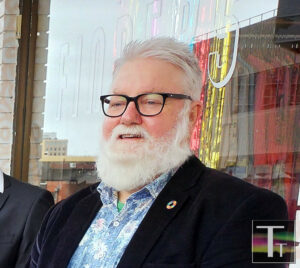
And a major component of that is the transformational things that will happen in the next decade or so in Hobart. And part of that transformation is the university, moving its facilities into the city. They’ve already done that in a number of locations, there is already a number of fantastic world class facilities that the university have established in the city. And that will continue over the next 10 years. Now, that’s not a decision that the City of Hobart has made. It’s the university’s decision to shift into the city. And they’ve been doing it for a long time now. And it’s their decision that they wanted to transform the Sandy Bay campus into a much needed housing precinct which will have up to 2700 houses. So that’s a university decision not a council decision, but what the council can do is ensure that all of those projects that come into Hobart are built to the highest quality that meet the planning scheme regulations, and really set a standard for Hobart. So I’m hopeful that the City of Hobart can ensure that those projects as they’re rolled out in Hobart are world-leading projects.
And with regard to the Sandy Bay campus, which the university has made the decision to develop, the City of Hobart needs to ensure that all of the developments on that campus site meet world standards when it comes to housing, and the other facilities that they’re hoping to build there. I would like to think that that sort of development can be a car-free development that maybe, you know, it’s a zone, it’s a precinct, it’s a suburb of Hobart that sets the standard for mobility options, that the people who live there choose not to have cars, and that they do choose to use other other means of transport, like public transport, walking, cycling, and even scooters to use to get into Hobart. So I think it’s a transformational time for Hobart. And we can really do well for the future of Hobart. If we make sure that all of these projects are done to the best possible standards.
Journalist – Imogen Elliott
UTas has been moving into the city for a long time now. And we’ve already seen buildings erected, what kind of a work did you do during that process to make sure that things were (inaudible)…
Bill Harvey
All of those projects were were put through the standard processes. They went through engagement processes, they went through the planning system, so we made sure that all of those projects did meet the planning codes, the planning requirements, and to date, most of those projects have been really high quality. The Menzies Centre is a world class institution, the Hedberg building is world class, the art school, the Domain projects have been sensational as well. So there’s no reason to believe that other projects in the city won’t be the same sort of quality.
You’ve got to keep in mind that a lot of these old buildings are really hard to retrofit. The University is committed to looking after these old buildings that they’ve purchased, and retrofitting them to the highest possible standards. Now, that’s much more important than having them demolished. You know, I don’t think many people in Hobart want to see all buildings knocked down and replaced with tilt-up concrete slabs. So to have the university in possession of some of these buildings, I think it’s really important for the heritage of Hobart, and I’m expecting a very good outcome from the university. But every project will be based and judged on its merits.
Tasmanian Times
Last time the Greens pre-selected Holly Ewin, now Jax, and you lost them before the election. So have you got them all on a tight leash this time?
Bill Harvey
Well, we’re really confident in this team that’s going forward into this election. It’s a really good broad base of skills and experience. So I’m really confident that all of these candidates could get elected. And if any of them do get elected, then they’ll be a great asset for the City of Hobart.
Tasmanian Times
Who’s going to be your Mayoral candidate?
Bill Harvey
Well, that’s still something we’ll be deciding.
Journalist – Imogen Elliott
And with Anna’s background with the Greens has that made it easier for you (inaudible) with her strategy?
Bill Harvey
Well, we’ve always had a very progressive, well, not always, as of late we’ve had a very progressive council. A lot more balanced. Once upon a time it was a very conservative council, but the council has come a long way and it’s a very balanced council at the moment. We’re hoping to both maintain that balance and increase the Greens numbers on council.
Nathan Volf
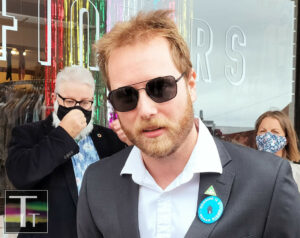
I’m an advocate for UTas to move into the city, purely based on the fact that it would then allow to build that 2700 medium density housing in Sandy Bay campus where it is now and that would then relieve some of the pressure that is now being put on Hobart and greater Hobart. For that is the pressure that has been placed on it a lot due to short stay visitor accommodation like Airbnb, and, of course, the growing housing affordability crisis.
I’ve been living in Hobart for nine years, I’ve fallen in love with the city. I love working with the young people in the city. I’d like to see young voices be a massive part of council. I’d like to work with young people to provide them the support that they need to make their voices heard. Because I feel that young people are the future of this council and I feel that young people are the future of this beautiful city.
Journalist – Imogen Elliott
You haven’t always lived in Tasmania, is that right?
Nathan Volf
Yes, I moved here when I was 19. I am a young person with disabilities. Hobart was an affordable place for me to go. It also had a far more access to medical appointments and things that I could attend to. And I’d like to see that continue. And for young people to have the same opportunities that I did. Diversity is decreasing in the city. And I feel that young people are being pushed out. We really need to make sure that young people are fostered and make sure to allow the spaces for young people to be in, for young people to grow and achieve all that they want to achieve.
Journalist – Kenji Sato
And how old are you?
Nathan Volf
I’m 28.
Journalist – Kenji Sato
Can you talk a little bit about your social work? So what kind of work do you do?
Nathan Volf
I work with a high school in the northern suburbs, I work with young people who have essentially felt that they do not fit mainstream education. It’s my job to support them in achieving all that they wish to achieve, achieve their goals. And a lot of my work is surrounding supporting young people to access shelter, and to access housing. I work in a large mental health space. My background is in psychology. And I am very, very proud and honoured to work with them and the trust that they place in me. And that working with them is the primary reason that I chose to join the Greens two and a half years ago.
Journalist – Kenji Sato
Some of your clients are waiting on social housing waiting lists?
Nathan Volf
Many. Immeasurable.
Journalist – Imogen Elliott
And what was the impetus for you to decide to stand up and speak out about this?
Nathan Volf
I was working with a young lady. I had been in the field for about a year. And it essentially broke my heart. The the young lady was speaking to me, she said, ‘No, I want to be honest, I want to be a social worker, I want to be like you. But I don’t know how I can do it. I live in social housing that is very far away from the city.’ And that social housing is not safe for that young person. So then when I was working with them, I was driving home and I was thinking did I do everything that I could to support that young person to achieve what they wanted to achieve? And I decided that I didn’t. So I decided to start political advocacy. And I found my home in the Greens.
Journalist – Imogen Elliott
And why have you chosen local government?
Nathan Volf
I’ve chosen local government because I really do feel that young people should have voices in all areas of Parliament. I’ve chosen local government because I really do feel like there’s significant work that can be done in local government, particularly the City of Hobart, to better support young people and to better allow them to engage in the democratic process, as well as engage in the landscape around the city, including art projects, urban projects, and people first projects. Thank you.
Gemma Kitsos
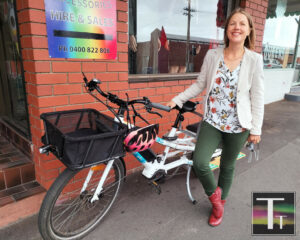
Journalist – Imogen Elliott
And what issues do you really stand for?
Gemma Kitsos
Look, I want Hobart to be a vibrant city. I want it to be clean, I want it to be green and I want it to be cycling safe. That’s really the key reason why I’m running in this election, because I think that Hobart can be a cycling city. Now, why cycling? Well, as a health professional in the health prevention space, I can see that we need a way to encourage people to change their lifestyle, to benefit their own health and to also reduce the burden on our healthcare system. So with the right cycling infrastructure, you get more active transport options for a broader range of people. With the university moving into the city, I think this is another key opportunity for making sure that people don’t get into cars when they don’t need to. But to do that, we need to make it safe. You know, we need to make it safe for people of all ages, for people with families, and we need to make the city accessible for those who need to access it via vehicle by decongesting.
Journalist – Kenji Sato
What is your research activity?
Gemma Kitsos
I work in stroke research under Associate Professor Seana Gall. Cardiovascular Research is such an important area at the moment because it’s a huge burden of disease; many, many people will suffer from stroke in their lifetime. And a lot of these risk factors for stroke are modifiable, exercise and diet being key.
Tasmanian Times
At a recent meeting the council discussed how to managed the e-scooter trial. What your view on the e-scooter presence?
Gemma Kitsos
Look, I love the e-scooters, I think they’re a fantastic initiative. I think the amount of people that are using them and what they’re using them for just shows us that there’s a demand, there’s a real need for this kind of thing. But we need to have the infrastructure to support safe use of the e-scooters, we need to make sure that that we’re using the technology available to us to control their use where possible. So working with the company to work on some of the geofencing. I’d like to see some designated parking spots and charging stations for e-scooters so that they’re not left in inappropriate places causing hazards for people who may have a disability or may have a health issue but find it challenging to walk around obstacles in the street. But, you know, I think it demonstrates why we need interconnectivity of our cycleways, of our cyclepaths, why we need to have designated routes for these e-scooters, for walkers, for e-bikes, for all kinds of active transport options. And this in the end will will activate Hobart and make it clean, make it green, and make it easier for people who need to access the city in other ways
Journalist – Imogen Elliott
(inaudible)
Gemma Kitsos
Yeah, that’s a really good question. My core motivation is climate change. And that may seem that it doesn’t link well into cycling. But I really believe that it does, because we need to make wins locally to have any chance of fighting climate change on a broader scale. So for me running for local government is an opportunity to have success in my own community and to really make a difference because when I read the doom and gloom and the future that this earth is facing, I felt nothing but despair for my children and for future generations. And so to become active, is really essential that we all do what is within our our power to get involved, to make change, and to have a positive influence as we we deal with this climate crisis.
Bec Taylor
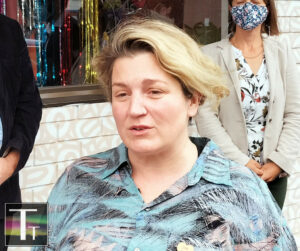
Journalist – Imogen Elliott
So tell us why you decided to put your hand up for your local council.
Bec Taylor
I’ve got a lot of reasons why I put my hand up. One of the main ones for me at the moment is that I am a small business owner, and I’m involved in retail. And I feel like state and local governments have done a good job to look at tourism and hospitality and how to support those businesses coming back from COVID. But I really think there needs to be more focus on retail and how council can support retail to recover not just from COVID but from the impacts that all of the building and changes within the city have had. It’s made it difficult for people to get into premises because of the roadworks that are going on, because of people coming into the city more en masse and because of the building that’s taken place. So I really think that business needs a voice, particularly through the retail lens.
Journalist – Kenji Sato
Obviously, there’s been quite a few very vocal shopkeepers who have been critical of the move to the city. Has that been a cause of friction for you?
Bec Taylor
I feel positive about the move for the university to the city. However, I think it needs to be very carefully managed. I think there needs to be better consultation with business. We had a large number of university students go in across the road from us here and instantly felt the impact on our parking and what that did for people’s ability to access our shop. We had very little consultation with us that that was going to happen. So I think it needs to be part of the process to constantly being engaging with businesses, keep us informed. Let us know what’s happening and give us a chance to talk about our concerns, and how that might impact us. If more parking had gone in around the corner, fine, you know that’s all great. We want that we want the university in the city, but we want to be included in the process.
Journalist – Imogen Elliott
There are a lot of people of business backgrounds on the council. What perspective do you think you offer that’s different from theirs?
Bec Taylor
I think I’m a business owner who is passionate about sustainability and shopping local. I don’t like the big box chains that are popping up all over Hobart, I love that Hobart is unique. And I believe we have the potential to be the most livable city in the world. And we’re moving in the right direction. But I provide a voice of somebody who’s a small business owner, I don’t have millions of dollars behind me or big corporations, I I’m local, I want people to shop local. I want them to think about sustainable shopping choices when they do that. And so a lot of my business and my passion is driven through what’s environmentally friendly and what’s the best thing for Hobart. I’m also a social worker, I’ve been a social worker for 20 years. I’m also an athlete and a coach. And so I have a broad range of interest in Hobart in lots of different areas. I’m a mother as well so I’m very concerned about nighttime safety and ensuring that council continues to do the great work that they’ve been doing in trying to keep the the Hobart waterfront safe at night. And also looking after some of our more disadvantaged community members. I don’t know why it’s taking so long for the rules to be changed around signage at the front of businesses so that they’re disability compliant. Those are the kinds of things I really want to see progress on, as well as looking after all the other things that I’ve talked about.
Tasmanian Times
You said Hobart could be the most livable city in the world. What key changes are required for that?
Bec Taylor
I think we need to make more consideration for how we get cars off the road. There’s a lot of people coming through the city on cars. The scooter trial is a great way to explore other avenues for transport. Active Transport is something that I’m very passionate about. We need to improve our roads, we need to improve our footpaths, and we need to put in bike lanes, that would make a massive change to Hobart. And just make sure that we continue to look after things in an environmentally sustainable way. Really cash in on the fact that we’re unique. We don’t need to look like other cities. Let’s take what Hobart has, our unique offerings, and really continue to push and celebrate those. And I’d really like to see a cultural shift in the way the council act and the way that councillors act. I don’t think it’s okay that people are being mis-gendered in this day and age, and I’m sick of hearing people say, ‘Oh, it’s Hobart.’ No, it’s not good enough. Hobart should be leading the way in being the best city that we can be, with the best council and the best policies and procedures. And if we can’t respect each other within that room, how are we supposed to look after our diverse and inclusive community members?
Journalist – Imogen Elliott
So have you been watching council meetings on YouTube and that sort of thing to get to gauge an understanding of what things are like?
Bec Taylor
I have. And I worked for council for 11 years as well. So I feel like I have a very good understanding of council, its processes and its procedures, its benefits and its challenges. At times I wonder, ‘Is this really what I want to be taking on?’ but I know that it is. I watch those meetings and I feel frustrated. I feel positive and encouraged at times, but that frustration is really pushing me to want to become involved. I want people to vote for me. I want people to vote for the Greens so that we can continue to be the most progressive council in Australia.
Tasmanian Times
Can you just clarify what your position and duties were in that role in council?
Bec Taylor
I was one of the people that was involved in community development. So I managed a number of areas in community development, community safety, children and families, multicultural communities, night-time safety. Liquor licensing and issues around gaming was something that I had a lot of involvement in, as well as the redevelopment of Collins Court in the city, I project managed that redevelopment. So I also have a very good understanding of planning issues and community consultation, I did a lot of community consultation. That’s something that I enjoy and I think it’s something that needs to continue to happen.
Journalist – Imogen Elliott
Anything else you’d like to add?
Bec Taylor
Just that the Greens have done such a good job for a very long time. They’ve shown that they are a steady, stable party, who have Tasmanians’ best interests at heart and in mind, and I encourage everyone to vote Green this election so that we can continue to do the great work that we’ve been doing for so many years.
Journalist – Imogen Elliott
Do you think the Liberal government’s failing Tasmanians?
Bec Taylor
100% I do. I do very much so and it makes me very disappointed and sad to be living in a place where there is so much potential, so many promises made and so many promises broken. And as somebody who works with at-risk communities, who coaches transgender children, who is trying to operate a business in a very difficult climate, I think that they do something but they don’t do nearly enough.

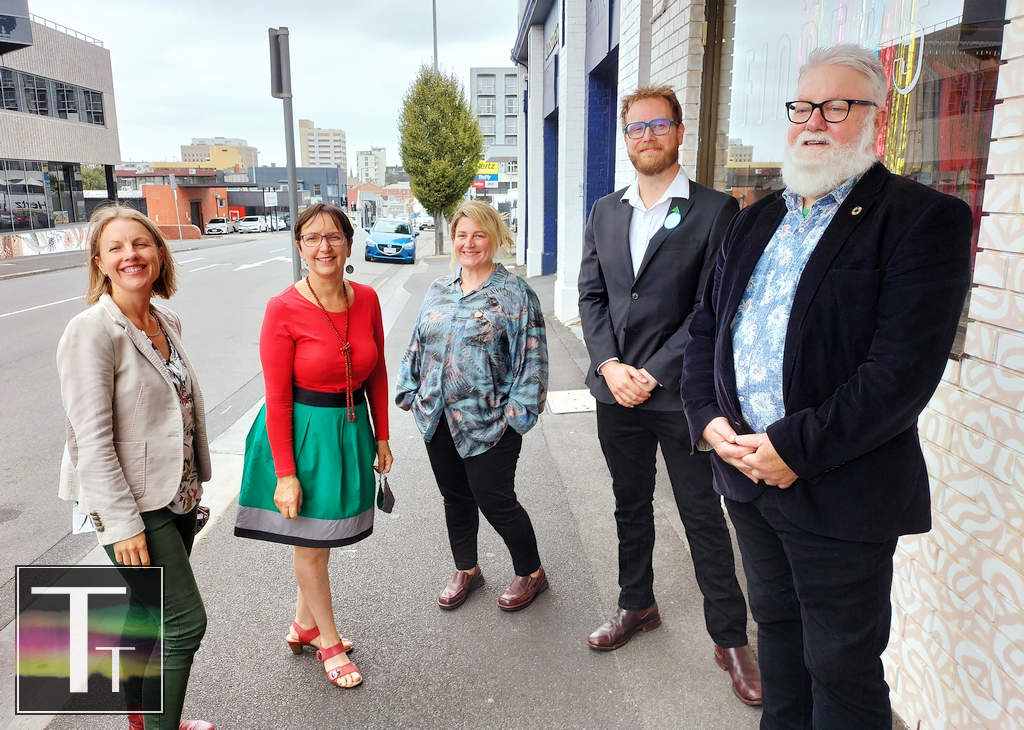
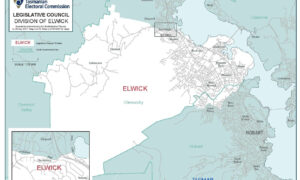

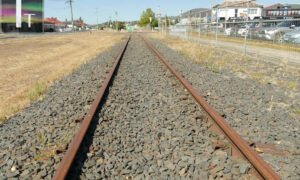





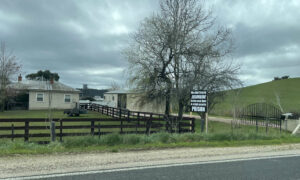



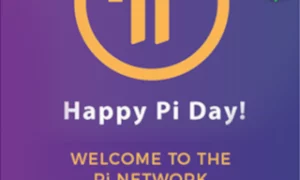



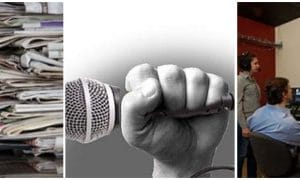







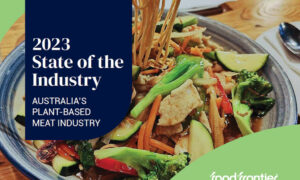



Geoff Holloway
February 15, 2022 at 14:33
What are the views of the Hobart City Council candidates with respect to transgendering children and adolescents?
Geoff Holloway
February 18, 2022 at 01:51
Interesting. The dominating images of men in the photo!
Deliberate?
Chief Editor TT
February 18, 2022 at 10:37
No. There was a photographer and a tv cameraman to the left of me, and it was the only angle I had. If I had gone to the other side of them I would have been in a dangerous position on the road.
Lynne
February 18, 2022 at 11:43
Will the Tasmanian Greens follow in the footsteps of the UK Greens by not only continuing to disallow women to speak about the impacts of gender identity laws on women and children, but actively expel them from the party?
Members standing this election actively tried to stop an event in Hobart from speaking out about gender identity laws and transgender health.
Why do the Greens actively erode women’s rights while pretending to be the party standing for humans rights? Are women’s rights not considered human rights?
Alex Meloni
February 18, 2022 at 16:10
The Greens have undoubtedly done heaps more for women’s rights than cranky TERFs on toilet patrol.
~~~~~~~~~~~~~~~~~~~~~
The term ‘TERF’ is an acronym meaning Transgender Exclusionary Radical Feminist.
— Moderator
RCD
February 25, 2022 at 13:00
The Menzies researcher to whom Gemma Kitsos refers is Associate Professor Seana Gall, not Shauna Ball.
Chief Editor TT
February 26, 2022 at 11:33
Thank you. We have amended accordingly.